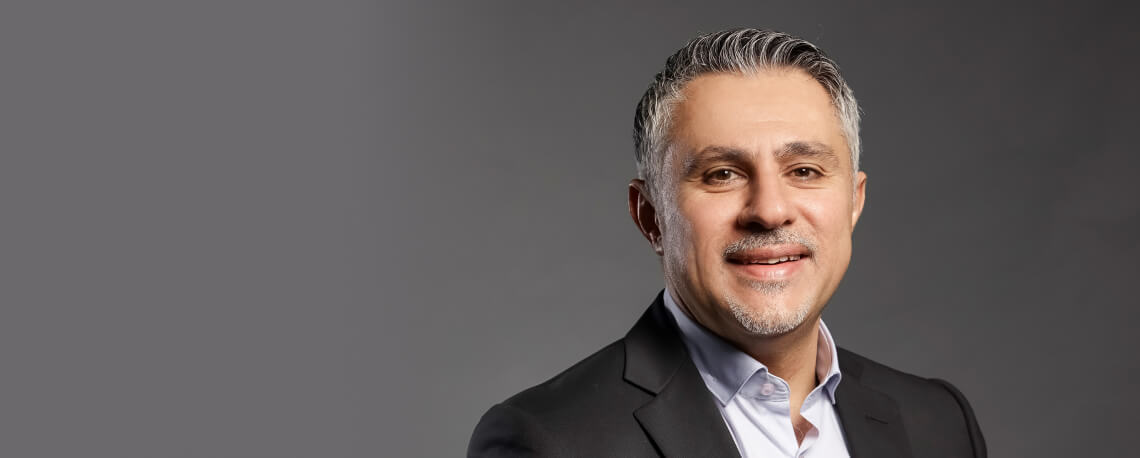
- Author: Richard McBride | CFO Australia Editor
- Posted: May 10, 2020
The New CFO > Crisis Financial Officer
Leadership in times of Rapid Change and Global Uncertainty.
CFO Australia Editor Richard McBride had the opportunity to discuss finance leadership during times of crisis and the role of the CFO with leading finance chief, Ralph Khoury. Based in Dubai Ralph is the Chief Financial Officer, MENA for Omnicom Media Group & TBWA\RAAD Middle East.
Ralph, thank you for your time today – You have a wealth of finance leadership experience spanning two decades at CFO level, living and managing through the Asian Financial Crisis, the dotcom collapse, SARS and the Global Financial Crisis. What makes Covid-19 different and how did you respond to the unfolding crisis from a CFO perspective?
The Global Financial Crisis hit the Real Estate and Bank sectors hard. SARS effected a few markets in Asia for a 2-3 month period. The Dotcom collapse killed dot com start-ups due to the absence of business fundamentals, whist the Asian Financial Crisis, drove a number of ASEAN markets to the brink.
Covid-19 is different as it a crisis that does not have limitations, impacting all demographics, cutting across all national borders, and all classes of society. It has forced us to lockdown in our homes, forced businesses and schools to shut their doors, halted events and any reason to congregate publicly or privately. The Olympic Games have been postponed as has the World Expo originally planned in Dubai for later this year. Soccer, Rugby League, in fact sport of any kind has been suspended or cancelled.
As a CFO, I focus on the economic and financial impact, but the social and mental impact on us all will certainly leave long lasting effects.
While the previous Crisis hit certain countries, markets or industry verticals (eg. Real Estate, Dot-com start-ups, Asia), Covid-19 has not discriminated. A common thread across previous crisis that I have had to manage through as a CFO has been the need to manage cashflow, credit risk and manage costs. But in those previous crises, there were no office shutdowns, no social distancing measures, no family lockdowns.
As a CFO, I have had to really change up my priorities and focus areas. Sounds simple and trivial, but the game-plan had to be clear and unambiguous. I set up a “war-room” made up of finance leaders across the business, who would meet on a Microsoft Teams call daily at 10am to discuss issues arising, priorities and action plans. Team members would be free to raise issues that they are facing in real time and by coming up with the solution together, others would adopt the same or similar approach as applicable. With the team working from home, the approach of connecting daily provided a level of foundation and structure, at a time when a lot has changed in peoples’ lives personally, with kids undertaking distance learning, parents working from home, and organized outdoor sports being suspended and many other effects.
We also spent time defining and redefining processes and controls to enable the entire workforce to Work from Home without impacting the delivery of client commitments nor our overall efficiency. As a finance function, we had to be equipped to be able to finalize the financial closing of the month & quarter from home.
Seems like an awful lot since the beginning of March ?
What should be the top priorities for CFOs right now and how far ahead should CFOs plan for in rapidly changing environments?
Investing time on scenario planning, in particular as there is a level of uncertainty along with a limited visibility as to when markets will recover, or when a vaccine might be available, and ultimately when consumer confidence and aggregate demand revives.
Planning ahead has certainly been a challenge. As such, looking to planning and navigating “point to point” becomes a key way to enable decisions to be taken based on facts and considerations available at that time. Should things change, the ability to pivot becomes key, as the need to push forward is maintained.
The CEO / CFO partnership is critical at all times, but elevated in times of crisis as people look to strong leadership – What kind of conversations should CFOs be having with their CEOs and how important is clear communication?
I have been extremely lucky to be working with strong world class, experienced leaders, CEOs that have taken the crisis in their stride, and extremely well versed in understanding the elevated risks that the crisis has presented. There have certainly been more conversations given how fast and widespread the crisis has developed. The communication from and the decisions taken by Leaders during a time of crisis has been a culmination of conversations, some very passionate conversations. I am convinced, that in the words of Nancy Koehn, Historian and Leadership Expert at Harvard Business School, that we will be “remembered, referenced and evaluated” on how we deal with this crisis.
What are Boards expecting from CFOs?
Given Covid-19 is truly a “black swan” event, which has disrupted what can be considered as “Business as Usual”, Boards expect, as they have had in previous crises, a heightened level of Risk management and mitigation from CFOs. For CFOs, it’s simply back to basics no matter what Industry they are in:-
- Plans and precautions to protect the health and safety of employees and their extended families.
- Reassuring Boards on Cashflow, and liquidity in the short to medium term.
- Cost Management as a “lever” that you can control, when revenue is reliant on factors outside your control.
- Heightened emphasis on providing early warning signals to any change of situation, be it internal or external. Limit the surprise factor, good or bad.
As for so many industries, the immediate and knock on effects of Covid-19 will have a major impact on businesses large and small – How have you been affected and how is the industry likely to respond?
The Covid-19 pandemic has fast-tracked many companies to mobilize on mass towards a “Work from Home” business environment. Prior to the crisis, there was a philosophy and impression that this was not possible, in particular on such a scale. The last few weeks and months have confirmed that it is possible, with the right business tools, processes and security protocols. In this regard, I truly think that our industry and almost all others have changed forever. With all employees now fully equipped with the right hardware, software and tools to ensure efficiency and effectiveness in this new normal, meetings, seminars and even client negotiations can now ordinarily take place on Microsoft Teams or Zoom. With such progress, one wonders when or if reconnecting in person will ever have value that it once had.
There is the old saying “Never let a good crisis go to waste” – The next decade is not going to be how we imagined it to be, but new opportunities will arise – How can CFOs prepare for the upswing and use this to their best advantage?
With Covid -19 being the largest global crisis that we have faced since World War II, one thing I have learnt is that something that we had previously taken for granted, will certainly change forever. Airline travel, large “in person” events, Live Sports, the demand for Cruise ship holidays, schooling and education are just a few.
CFO’s across all Industries and market need to think long and hard about what a post Covid-19 business environment looks like and ensure that their businesses have adapted to the new normal. Whilst protocols around how to do business are being redefined, the basic principles of strong cashflow management and cost control, that we lend on during any crisis will hold us in good stead for the eventual upswing, when it does come.
Thank you for your time today Ralph, one last question, from previous crisis events, what have been the best pieces of advice given to you that you can share with CFOs today?
An older, but definitely wiser CFO, whom I owe a lot to, during a previous crisis, shared with me 2 points, which are relevant today and even more so as we look forward:-
- Focus on what you can control, and don’t spend endless time on what you can’t control. Sounds simple but when adopted as a principle, it can make decision making a whole lot clearer.
- Remain true to the key underlying business fundamentals that will deliver any business a healthy balance sheet – the focus on improving cashflow, and liquidity. Be sure, it will insulate the company against further crisis impacts, potential relapses and the road to crisis recovery.
More recently I have spent time listening to Nancy Koehn who advocates that today we are in the First Chapter of a 4-5 chapter story. She advocates to leaders in uncertainty to navigate point to point, whilst maintaining the ability to pivot, switch directions as needed, learn quickly, and move to the next point. There’s a lot in that, but it’s very symbolic of the challenge ahead.








